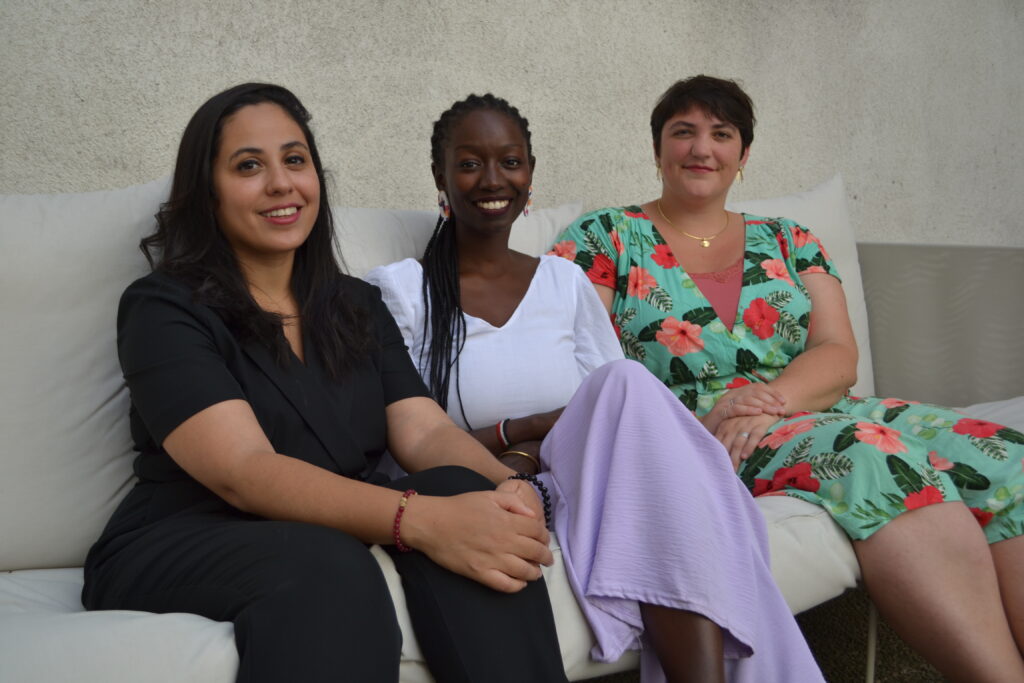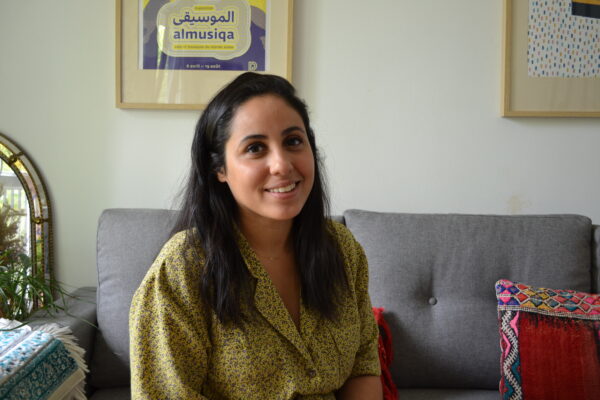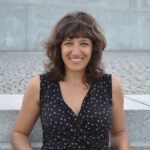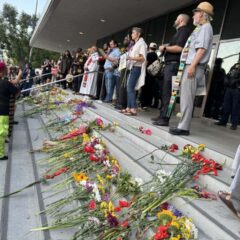When Sarah Zouak was a graduate student in France, an adviser told her that the phrase “Muslim feminist” was a contradiction in terms. Zouak had proposed a thesis on the topic when the adviser laughed. “No, no,” said the adviser, whom Zouak declined to name. “You are either a feminist or a Muslim, but you can’t be both at the same time.”
That exchange, disappointing at the time, provided fuel for what would become Zouak’s life’s mission. Not only did she pursue a thesis on Muslim feminism, she went on to co-found a French Muslim feminist group. Lallab, based in Paris, exists to “make the voices of Muslim women heard and to defend their rights,” she said. The group’s name is a portmanteau of the Arabic word for madam, “lalla,” and the French “laboratoire,” or laboratory.
The organization helps Muslim women — its 500-plus members are called “Lallas” — undergo a “healing process” by learning about overlapping sources of oppression in their lives. It then dispatches them as activists to transform French society. In addition to other initiatives, Lallab has focused on changing the French news landscape by pushing media personalities to interview Muslim women on issues of their concern, such as restrictions on religious dress in the public sphere. “In France,” said Zouak, “We were always talking about Muslim women but without any Muslim women on TV.”
Zouak’s road to starting Lallab began in childhood. The daughter of Moroccan immigrants, Zouak, 34, said she was raised to be proud of her “multiple identities.” She grew up in multicultural Ivry-sur-Seine, a historically Communist Paris neighborhood, and visited Morocco during the summer. Though her parents didn’t use the word “feminist” to describe themselves, they embodied the term, pushing Zouak and her two sisters to be independent.
“All the things I learned as a feminist were their ways of seeing and contributing to the world,” she said. Her parents also taught their daughters about Islam, emphasizing the surahs about how men and women were equally obligated to follow the religion’s humanistic teachings. “They were teaching us that as women we should be actors of justice,” no different from men, she said.
Zouak said that her childhood with her “perfect” parents was a “bubble,” one that inevitably burst as she came of age in France, a staunchly secular country where religious expression, and especially Muslim expression, is policed in the public sphere.
“I understood really quickly that being a girl, being Arab, and being Muslim was not really a good thing here in France,” she said. She recalled neighbors telling her parents that their daughters were well behaved “for an Arab Muslim family”; at school, other students teased her by calling her father a “terrorist.”
As Zouak pursued her academic degrees, she was mystified by what she felt was a cultural insistence that she had to choose between her faith and her ambition. “In France, they were always talking about how faith is an obstacle for female empowerment,” she said. Zouak knew that wasn’t true — and after she finished school she decided to prove it to a wider audience by embarking on a documentary project to interview 25 women leaders in Muslim majority countries.
The resulting film, which she completed with Lallab co-founder Justine Devillaine, was a sensation among French Muslims — a population of more than five million — drawing audiences of women who stayed after screenings for deep conversations about their lives and struggles. Zouak knew that she had hit upon a need – and in 2016, Lallab was born.
Paya Ndiaye, who saw the film and quickly joined Lallab, grew up “between two different cultures” as the daughter of Senegalese Muslim immigrants to France. Lallab proved a place where she didn’t have to choose which part of her identity to emphasize; she now works for the group as an organizer and training manager.
It “was the first time I met with an organization that allowed me to really address all the things I was saying at once without selecting which part was more important to me at the moment,” Ndiaye said.

Over the years, Lallab’s work to empower French Muslim women has been met with pushback, including online harassment campaigns and criticism from politicians. In 2022, a government agent even showed up at Lallab’s annual festival to surveil the organization’s work, Zouak said. Now, Zouak and other leaders fear for Lallab’s future.
The Collective for Countering Islamophobia in Europe has documented the widespread shuttering of mosques, Muslim schools, and associations in France under a 2021 law against “separatism.” The legislation gained steam after several high profile attacks, including in 2020 when an 18-year-old Muslim man beheaded a teacher following an online campaign accusing him of insulting the Prophet Muhammad in class.
Devillaine said that the group’s close ties with other feminist groups in France likely shielded it from closure in the past, but since the 2021 law, “we don’t feel protected anymore.” She added: “We know we are scrutinized, there is no question about it.”
The environment in France has felt even more restricted in 2023, Zouak said, citing an “intense, even obsessive focus” on the outfits of female high school students after Gabriel Attal, the new education minister banned the abaya in public schools on the grounds that the loose-fitting garment makes religious identity apparent in what should be a secular place. (The hijab has been banned in public schools since 2004.)
“Young teenagers have thus experienced what can easily be described as a wave of harassment within their schools,” said Zouak. “Summoned, questioned and insulted, many young girls had to justify their choice of clothing and explain their religious beliefs, family habits, opinions on the terrorist attacks and so on.” She said that Lallab has fielded “numerous requests for help from students, parents and teachers, powerless to stem this collective crisis.”
This difficult year has also had moments of optimism. Lallab’s mission received a boost when Zouak, Ndiaye and another Lallab leader underwent leadership and storytelling training at the Harvard Kennedy School, an experience that they have already applied to Lallab’s collective organizing.
Zouak has a clear vision of what’s next: “The future of Lallab is to continue to create more solidarity, to produce our own narratives and to continue to build power in French society,” she said. One component of building power is to show France that Muslim women are not victims but the agents of their own destiny.
“I hate when people say you are a voice of the voiceless,” Zouak said. “We all have a voice, it’s just that you don’t want to hear ours.” Yet.
Naomi Zeveloff is a journalist fellow with the Spiritual Exemplars Project.





